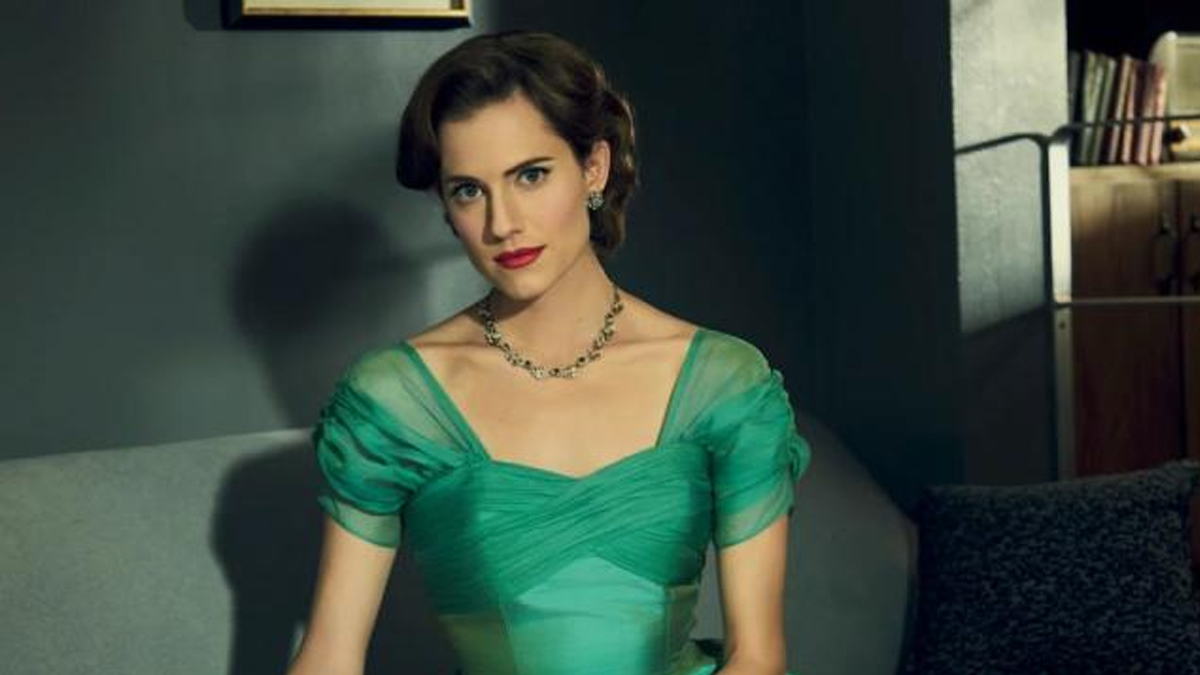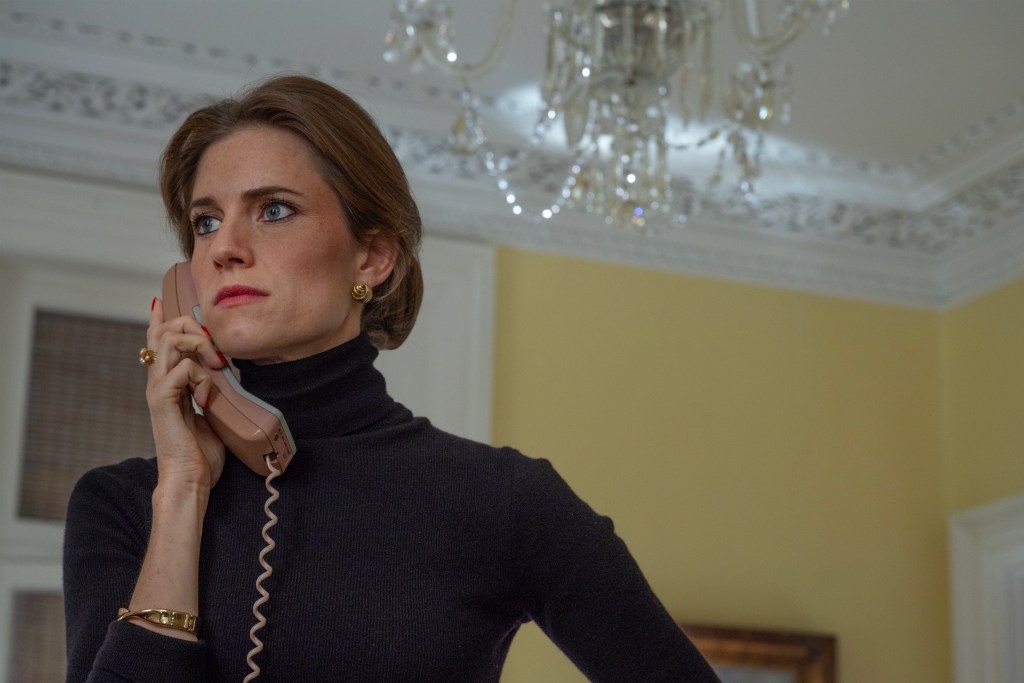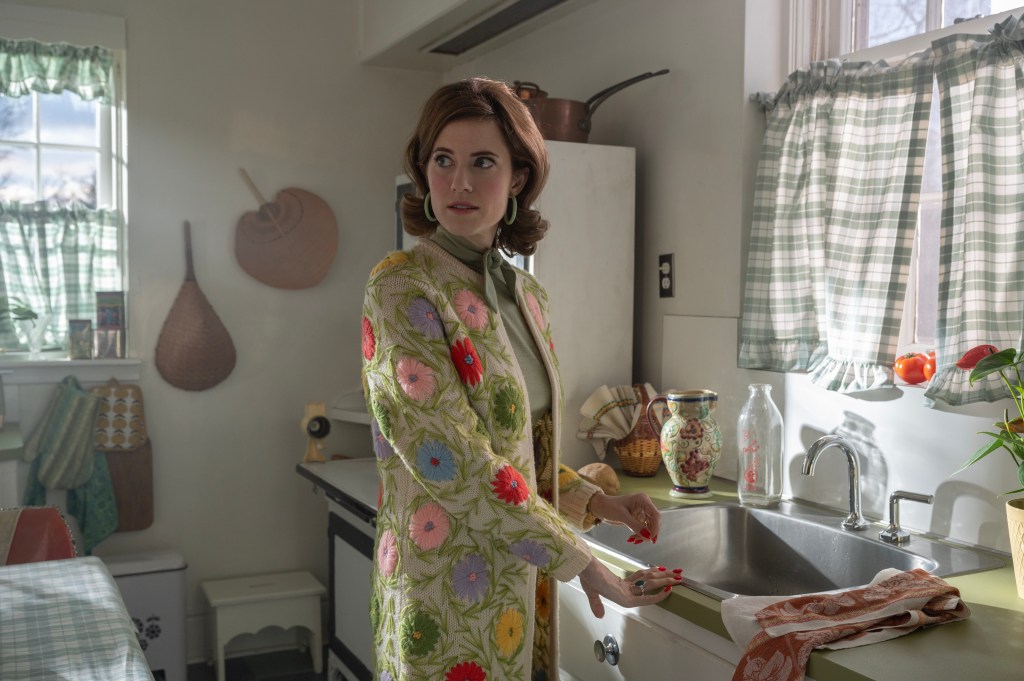
This interview originally appeared on our sister website, AwardsRadar.
Based on the 2007 fictional novel of the same name, the Showtime/Paramount+ series Fellow Travelers follows the paths of political staffers Hawkins Fuller (Matt Bomer, White Collar, Magic Mike, Maestro) and Tim Laughlin (Jonathan Bailey, Bridgerton, Broadchurch, Wicked), whose paths converge at the height of the Lavender Scare of the 1950s. Despite the constant threat of getting caught, their love for each other only intensifies throughout the following decades.
Allison Williams (Girls, Get Out, M3GAN) portrays Lucy Smith, the daughter of a Senator who becomes smitten with, and eventually marries, Hawk, despite her possible suspicions of his homosexuality. Awards Radar spoke with Williams about what drew her to the project, the theme of lying to yourself, and portraying the same character at various points in their life.
Can you tell me what drew you to the role of Lucy?
It was one of those undeniable things. From the cover letter, just describing it, seemed awesome and important. The moment I started reading the script, I realized that it was beautifully written, and the story is beautifully told. Although I did have a moment reading, because I had seen that I was supposed to read for Lucy, but it says in the pilot that she’s in her late 50s, and I was like, ‘Oh, we’re here already. That was fast.’ Then I read on and realized I’d also be in my 20s. But I was drawn to every part of it. I was drawn to Lucy, I was drawn to the script, the story, the other characters, the time periods, the subject matter, the creative team involved. Every single aspect of it, I was like, ‘Yes, I have to figure out a way to make this work.’ I feel very honored.
Was it offered to you, or was it something you had to audition for?
A little bit of both. I think I was an idea of someone they would want for a Lucy, and I also read with Matt. We did some scenes together via Zoom, which is a very, very strange experience. Matt and I have known each other for years, and we’ve wanted to work together, but I guess there’s always a chance that the chemistry can just feel bizarre. So, I guess that was a kind of audition, but I have since been told by [Executive Producer] Ron [Nyswaner] that after our initial coffee, at which point the role was not mine, he was like, ‘Well, I think that’s Lucy.’ So, I guess the way to put it is it was mine to lose.

Lying, specifically lying to yourself, is a central theme in the series. Can you talk about how that applies to Lucy?
Well, it’s interesting. One of the things we talked about often through the course of working on the show was versions of knowing; the types of knowledge that there are available to us in the world, and the deals we make with ourselves and with others, and explicit, implicit deals, and explicit, implicit truths. So, dialing up and down the various things that Lucy knows and the things she kind of knows was a really important part of playing this character. She has two men in her life who are closeted and gay and very important to her. The extent to which she knows about each of them is a hard question to answer at any moment in the script, and one that we had to come up with answers for to inform the performance. But it can kind of go either way. There are very few frank coming out conversations in the show. It’s people who can kind of sense something about each other. And then the question is, ‘What then?’ So, even if there had been suspicions prior to getting married, it’s kind of confirmed for her after that. But she asks herself, ‘What is the more important thing in my life? What matters to me?’ And it was a family.
So in that way, whatever she kind of knows, she doesn’t want to empirically know. And she does know that the things that she really wants are having children and having a family. Then the question is, ‘Okay, you make those deals with yourselves early on. How do those deals look 10, 20 years down the line? Do you still want the same things? Are you still the same person?’
The story is one of growing into deals you’ve made when you were younger and figuring out whether your clothes still fit or if you need something new. It’s interesting to hear you say lying to herself because if anything, it was a lie of omission, but I think she kind of knows everything at all times in a way. And I think it’s the weight of that knowledge that is so heavy for her to bear.
It was also not a choice she had. People couldn’t live in their free expression of who they were. What was she gonna do? Out her brother or just sit him down at the table with the family and be like, ‘Just tell us, are you gay?’ That just wasn’t the time they were living in. I’ve heard from a lot of women who had siblings or whose moms lived in that scenario and who watched that happen. I actually think compared to the stories I’ve heard, Lucy and Hawk handled it kind of beautifully by trying to maintain their focus on what really, really mattered to them, which was their children.
Hawk is portrayed as a pretty selfish character, but do you think there is some selfishness on the part of Lucy for going through with this marriage that may or may not have been a facade?
Well, I think Lucy spent much more time considering, ‘What are my actions going to do to the people around me? How are they going to impact the people I love?’ Hawk spent very little time thinking about that. At the end of the show, I think he wished he had thought about it much more. I think Lucy, by the end, realizes she had spent her whole life contorting herself to fit this narrative that just was so far from being real that she couldn’t tolerate it anymore. And while one could classify the choices she made as selfish, I ultimately believe that she does spend a lot of time suffering for what she believes to be the good of the family.
Now, one could also argue just people living authentically and being happy as parents is a much happier household for kids. But, that idea of staying together for the kids and creating this illusion of perfection for the kids would have definitely been what she felt was like the most selfless strategy she could have deployed at that time.
As a performer, how do you view the character of Hawk? He’s the protagonist in this decades-long love story, but from Lucy’s point of view, he was kind of the villain.
It’s hard to understand their relationship without really thinking about their past, which is that he was just the hot friend of her brother’s that was around occasionally. It very exciting when he was at the house. He was was this very handsome guy who did everything right, plus her dad loved him. He was this mythic figure who was kind of godlike to her.
I think over time, she just felt so much warmth towards his ability to make her dad feel calm, take care of his life, really be part of the family and be the brother in this way that sounds kind of incestuous, but be the son figure to her dad that her brother couldn’t be. Her brother just kept disappointing the family and messing up, and I think she saw in Hawk someone who knew how to do everything right. There were probably little voices in her head that said, ‘Why is he still an eligible, gorgeous man who is so good at everything he does? What is he doing still a bachelor? But, she was still single. So in her mind, she probably just thought, ‘We’re both picky. We’re just waiting.’
One of the things Ron and I always talked about being very important to the show was connecting to the love that the characters feel for each other. It’s very easy in these stories to forget that there were months and years of kicking off their heels in the front hall, lighting up a cigarette and watching a TV show together, or eating out of a pint of ice cream together. The two of them were extremely close and they went through some tragedy, which bonded them together on multiple occasions that we see in the show. I see them as fellow travelers in a less loaded version of it where they’ve literally traveled life in tandem. They’ve known each other since they were very young. They’ve walked the same path. They have all the same cultural references. They have all the same people in common. They can refer to people by first name, shorthand.
I see that as a very harmonious, loving, connected relationship. And for Lucy, I cannot imagine the amount of pain having Hawk as a husband must have caused for her. The incredible pain of knowing that your husband has deep desires for people that are not you. The pain of living in that truth every single day without addressing it must have been really, really, really hard.

The series is not in chronological order, and Lucy knows different things at different times. How did that affect you as a performer?
It basically just meant a ton of notes on a bunch of different chronologies. I had one set of notes that was just chronological, like, ‘These are the events of Lucy’s life on and off screen,’ told as a timeline. Then there was one that was, ‘Here are the events of Lucy’s life that we see on screen told in script order,’ in terms of when we’re gonna see them on screen. And then, ‘Here are the things that the audience knows in order of when they know it and what does Lucy know?’ So, it was really complicated, but you know, let’s give this English major brain something to do. It was really fun.
Ultimately, the whole creative team behind the show is so aligned on every single detail of everything that, if for a moment I had been playing a version of her that was in the seventies, even though I was in the sixties or the fifties, then someone would have picked up on it immediately. But also, you always know where you are in time and place because her look changed so much over the course, and voice and body and everything. So all of that was part of the preparation of it was to really distill who is this woman at this point in time.
But yes, you’ve hit on something that was really complicated. And we didn’t even shoot the episodes in order necessarily. We shot them in blocks. That was the hardest part by far. But if that’s the hardest part, this is a very, very fun job.
I thought they did a really nice job with hair and makeup without overdoing it.
So talented. So, so talented. Yes, Jordan [Samuel] and Michelle [Côté] were brilliant. And Joseph [La Corte] who did the costumes. I think it’s a really hard thing to achieve because it’s jarring either way. I’m sure if they had done photorealistic, completely accurate aging on all of us down to every single detail, it would have been too much. And if they hadn’t done as much as they did, it would have seemed too little. It’s about finding a happy medium that isn’t necessarily real, but what looks right on screen, knowing that what our audience is expecting. How much disbelief are we hoping that people will be able to suspend? We’re hoping that people have lost track of us as humans and they’re just seeing the characters. I think they did an incredible job.
It was all practical, for Lucy at least. One of the things I loved about what Jordan emphasized in the makeup for the facial aging was breaking rules as a way of emphasizing mature facial features. We would do a little bit of creping on my eyelids, for example. It’s kind of a freaky process because it really just emphasizes what’s coming. You pull all the skin taut, you apply this substance, it’s like glue basically, and then you let go of it and you put powder on it. Then you just see every single line start to emerge that you have in your face.
So, that in and of itself is quite an experience. But then if you have a part of your face that has lines on it, one of the makeup rules of thumb is you don’t put anything metallic on that surface because it draws attention to it and the light will hit all of the creases. And so he applied metallic makeup onto the creases to help emphasize it.
So, rather than putting some heavy prosthetic on my eyelids, he just put the wrong makeup on on purpose to help play into that. I learned so many things from the whole team. Everyone was so thoughtful in taking us up and down through time.
I also got to play younger than myself, and the experience of taking off older makeup is very different from the experience of taking off younger makeup. One is met with relief, and one is met with wistfully hoping to put the young makeup back on.

How did you approach your performance within each time period? Were you trying to emulate different ages in your performance?
I was. I worked with a dialect coach named Rhea Nolan who also ended up being kind of a spirit guide through Lucy’s evolution. And I always work with an acting coach named Gina Rattan, who is super talented. They both helped me kind of chart where she was in time as I was moving through it. And it affects everything. Your voice gets lower with age, gesticulations change, your posture changes, your body changes and the speed that you talk changes. We literally picked out notes on a keyboard for where Lucy’s midpoint in her range was in any given decade. I also modeled her way of speaking off of a dear friend of my grandmother’s who has just the perfect voice. I had to dial it back slightly because again, it’s so accurate that it would have sounded a little weird to our modern ears.
But using that and also adding a smoker’s voice with time, allowing more gravel, the lower register as the years go on. Decades of hardcore smoking is gonna do something. It’s gonna impact your voice and the way you carry yourself. And keeping in mind that Lucy is someone who would have wanted to present very well at every point in her life. So, it was kind of fun to play someone who just was always putting her best foot forward and trying to project the best version of herself in that way.
You can watch our full interview with Allison Williams below.
Fellow Travelers is currently streaming on Paramount+.

